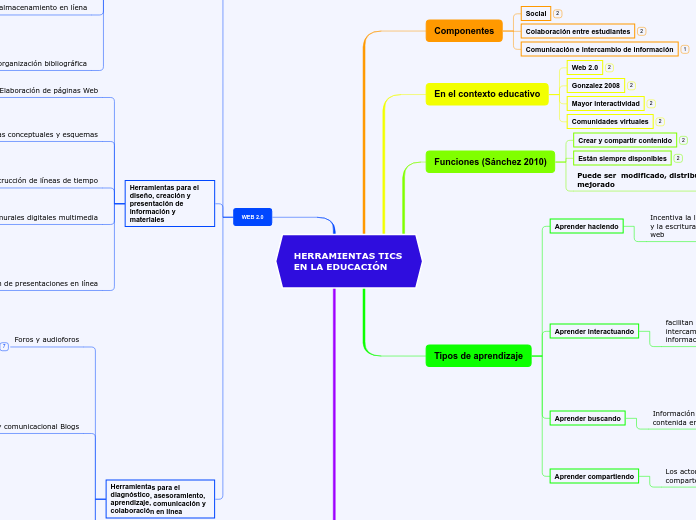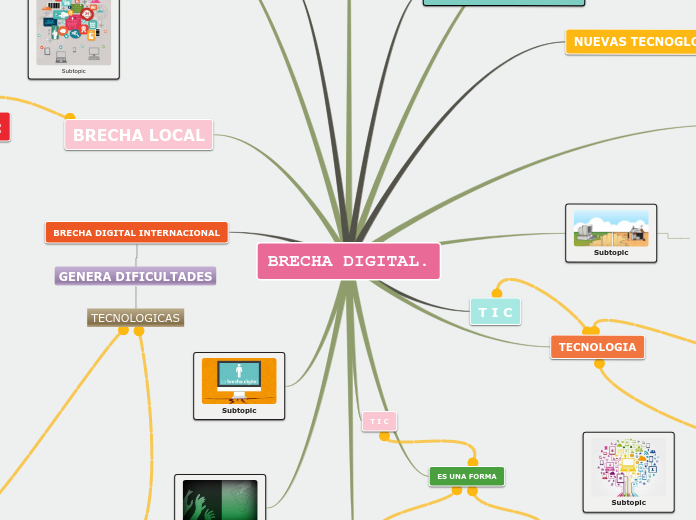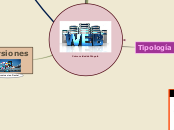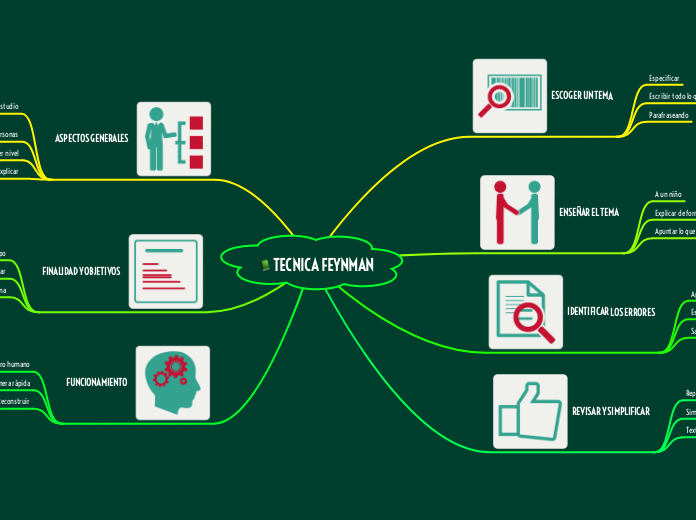HERRAMIENTAS TICS EN LA EDUCACIÓN
The part of speech is a category to which a word is assigned according to its syntactic functions. In English the main parts of speech are noun, pronoun, adjective, determiner, verb, adverb, preposition, conjunction, and interjection.
La Web ampliada
A conjunction is a word like 'if' 'but' or 'and' which is used to connect sentences or clauses together.
La web ubicua
Dispositivos móviles
Web semántica
Coordinating conjunctions always connect phrases, words, and clauses. They are: for, and, nor, but, or, yet, so.
sistemas de metadatos
LA web 3D
Entornos virtuales, videojuegos, navegación en tres dimensiones
La web 3.0
Subordinating conjunctions are conjunctions that are used at the beginning of subordinate clauses. Some examples of these conjunctions are: although, after, before, because, how, if, once, since, so that, until, unless, when etc.
Although it was raining, I went out.
WEB 2.0
An adverb is used to describe a verb, but it can also describe an adjective or another adverb.
Adverbs normally help paint a fuller picture by describing how something happens.
Herramientas para el diagnóstico, asesoramiento, aprendizaje, comunicación y
colaboración en línea
Redes sociales
Snapchat
Ning
Schology
Instagram
Tweeter
Facebook
Edmodo
Ámbito informacional y comunicacional Blogs
Ofimática en línea
Zoho
Wetpain
Mediawiki
Wikispaces
Wordpress wikis
Foros y audioforos
Videoconferencia
Anymeeting
Google hangout
Voice Thread
Voxopop
Phbb2
Herramientas para el diseño, creación y
presentación de información y materiales
Elaboración de presentaciones en línea
Prezi
Scribd
Zentation
Construcción de murales digitales multimedia
Padlet
Glogster
Construcción de líneas de tiempo
Dipity
Elaboración de mapas conceptuales y esquemas
Mind meinster
Mind 42
Bubbl us
Elaboración de páginas Web
Wix
Google sites
Weebly
Herramientas p ara la gestión y organización documental y organizacional
Sistemas de gestión y organización bibliográfica
Mendeley
Sistemas de almacenamiento en líena
iCloud
Google drive
Onedrive
Droxbox
Calendarios en línea
Anotadores en línea
Anotary
Planificador de reuniones
Scheduleone
Doodle
Calendario de Hotmail
Gogle calendar
Marcadores sociales
Mr. wong
Delicious
Diigo
Tipos de aprendizaje
A pronoun is a word that can be used in place of a noun, typically after the noun itself has already been stated.
Aprender compartiendo
A reflexive pronoun ends with ...self or ...selves and refers to another noun or pronoun in the sentence (usually the subject of the sentence). The reflexive pronouns are myself, yourself, herself, himself, itself, ourselves, yourselves, and themselves.
Los actores intercambian, comparten y discuten ideas
Video cast
Podcast
Procesadores, texto en línea
wikis
Aprender buscando
Demonstrative pronouns are used to demonstrate (or indicate). This, that, these, and those are all demonstrative pronouns.
Información contenida en la web
Aprender interactuando
Possessive pronouns are used to show possession. The possessive pronouns are mine, yours, his, hers, ours, and theirs.
facilitan intercambio de información
Google docs
Blogger
Flickr
Subtopic
Youtube
Skype
Messenger
Aprender haciendo
The personal pronouns are I, you, he, she, it, we, they. More often than not (but certainly not always), they replace nouns representing people.
Incentiva la lectura y la escritura en la web
Google Docs
Slideshare
OFFICE
Funciones (Sánchez 2010)
An adjective is a word that's used to describe a specific noun and to provide more detail to the listener.
Puede ser modificado, distribuido, mejorado
Están siempre disponibles
Superlative adjectives demonstrate a higher level of comparison between entities.
She is the prettiest princess.
Crear y compartir contenido
Expresses a comparison between two entities or groups of entities in quality or degree.
He is taller than she is.
En el contexto educativo
A noun is defined as a person, place, thing or idea. Proper nouns always begin with a capital letter. Common nouns, which are general words, such as 'cars,' are not capitalized.
Comunidades virtuales
Compound nouns are words where two nouns have been stuck together to make a new noun. Compound nouns should be written as one word, without a hyphen.
Candlestick
Mayor interactividad
A noun which refers to a group of things/people.
Family, Class
Gonzalez 2008
Countable nouns are nouns that can be counted, even if the number might be extraordinarily high.
Uncountable nouns are nouns that come in a state or quantity which is impossible to count; liquids are uncountable, as are things which act
like liquids.
Cats, Rain
Web 2.0
Proper nouns are the names of specific people or places. They should always begin with a capital letter.
Mary, Paris
Componentes
A verb is an action word or 'doing' word that signifies movement in some way.
Comunicación e intercambio de información
A modal is a type of auxiliary (helping) verb that is used to express: ability, possibility, permission or obligation. The main modal verbs in the English language are: can, could, may, might, must, shall, should, will, would.
Colaboración entre estudiantes
A linking verb connects the subject with a word that gives information about the subject, such as a condition or relationship.
You look exhausted after studying all night.
Social
A verb with its own meaning: a verb that is not an auxiliary verb.
Create sentences
They have it.









